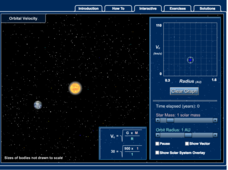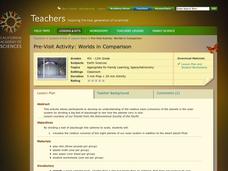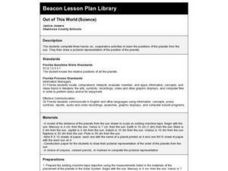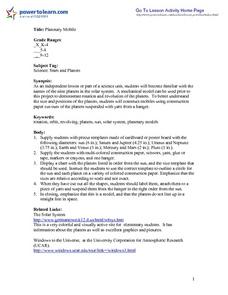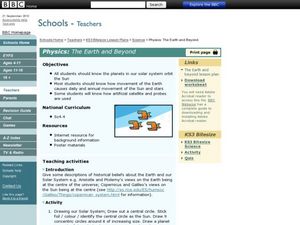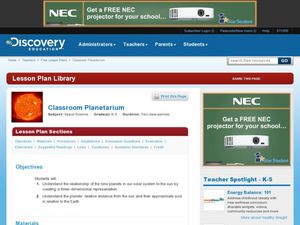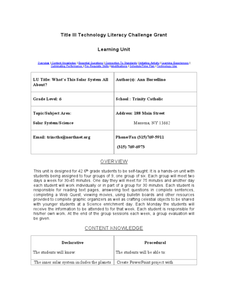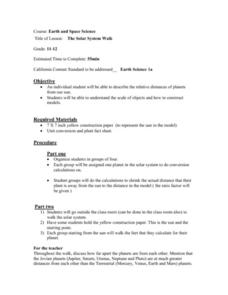Curated OER
Planets in Balance
Students study the solar system by researching the planets. For this exploratory lesson students divide into teams and create mobiles.
Curated OER
The Toilet Paper Solar System
Explore the solar system with this lesson. Learners create a model of the solar system using toilet paper. With this creative approach, learners create a solar system according to distance and scale parameters, and write down a list of...
Research Parent
Solar System Cards
Find all things solar system in a set of reference cards. Even Pluto makes an appearance! Each of the 24 cards has a picture and accompanying informational text that gives brief background about the object.
McGraw Hill
Orbital Velocity Interactive
Why does it take Pluto 90,000 days to orbit the sun, but it only takes Mercury 88 days? An interactive lesson helps pupils find a connection between the speed of orbit and distance a planet is from the sun. The simulation allows for...
Pacific Science Center
Worlds in Comparison
Young astronomers follow a step-by-step procedure for dividing a lump of dough into parts, resulting in a scaled volume set of puny planets. Along with the printable directions is a template chart of planet names on which learners can...
University of Colorado
Phases of Charon
Charon, the largest of Pluto's moons, was discovered in 1978. Lesson is a walk through of how to solve for the phases of Charon. It uses two different points on Pluto and takes into account the tilt of the pole, the rotational axis, and...
Curated OER
Voyage: A Journey Through Our Solar System
Thoroughly written, this plan walks you through every detail of having your high school astronomers design scale models of the solar system. Complete instructions on building to scale, lesson procedures, and associated worksheets are all...
Curated OER
You Are Here
Learners determine the relative size and distance of the planets in the solar system. They use ratios in their mathematical calculations to make models of the planets after discussing the relative sizes of the planets. They keep a...
media.yurisnight.net
Science Lesson Plan: Our Solar System: I Wonder?
Ever wonder why Pluto isn't considered a planet? Or how large the Earth is compared to the other inner planets? Explore the universe with a series of projects that simulate different aspects of our solar system. The activities require...
Curated OER
The Outer Planets
In this planets worksheet, students research the diameters and sizes of the planets. Then student will create scale model sizes of the planets out of cookie dough. Students complete 5 short answer questions.
Curated OER
What's "Out" There?
First graders investigate the five outer planets. In this space science lesson, 1st graders read the book Our Solar System and identify the five outer planets. Students create a booklet and write about outer planets.
Curated OER
Toilet Paper Solar System
Students create a model of the distances of the planets in the solar system using sheets of toilet paper and markers. Generally accepted orbital parameters are applied.
Curated OER
Out of This World (Science)
Students participate in various hands-on activities to visually demonstrate the positions of the planets from the sun. Then they draw a pictorial representation of the order of planets from the sun.
Curated OER
Planetary Mobile
Students receive pre-cut templates of cardboard with appropriate diameters of each planet and the sun. They use multi-colored construction paper, scissors, yarn, and other art supplies to create their own models of planets. When students...
Curated OER
Walk a Mile in your Orbit
Students create an awareness of the distance between the planets and the complexity of the solar system through a model of an active solar system. they incorporate physical education and math with the ability to convert distances of each...
Curated OER
The Solar System
In this solar system instructional activity, students complete a word puzzle by determining the terms associated with the 10 statements about the planets.
Curated OER
Astronomy
Students complete a unit of lessons on our solar system, its stars, and astronomers. They record information in a space journal, design constellations, define key vocabulary, observe the phases of the moon, and create a group planet...
Curated OER
Scavenger Hunt: Who am I?
In this space science activity, students use the sites listed on the Solar System and Planets page of the Kid Zone to locate the names of the people credited with each discovery. They identify and name 26 different scientists who made...
Curated OER
Physics The Earth and Beyond
Fourth graders will explore our solar system. In this physics instructional activity students create a model of the solar system to explore the movement of Earth, the Sun, and stars.
Curated OER
Introduction to the Planets
Students become familiar with the members of the solar system and planetary order. They identify differences and characteristics of individual planets. Finally students visualize the great size of the solar system and make the image more...
Curated OER
Our Place in Space
Third graders identify the different planets that make up the solar system. In this space science lesson, 3rd graders construct a scale model of the major planets. They explore their different unique features and dress up as planets.
Curated OER
Classroom Planetarium
Students work in groups to create the planets of the solar system. In this planets lesson, students create a hanging solar system taking into account the size, shape and position of the planets. Students discuss the gravity on each...
Curated OER
What's This Solar System All About?
Sixth graders complete a unit of lessons on the solar system. In small groups, they participate in a Webquest, watch movies, complete graphic organizers, and answer questions, create a model of the planets, and develop a Powerpoint...
Curated OER
The Solar System Walk
A unique lesson on the solar system, and some of the mathematics associated with it, is here for your high schoolers. Pupils are put into groups of four, and each group is assigned one of the planets from our solar system. They must...





